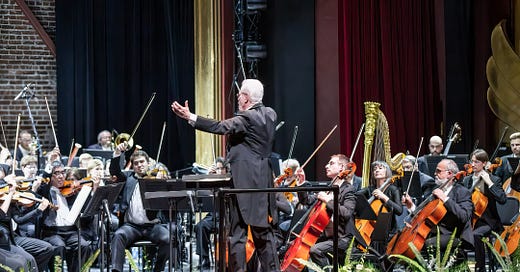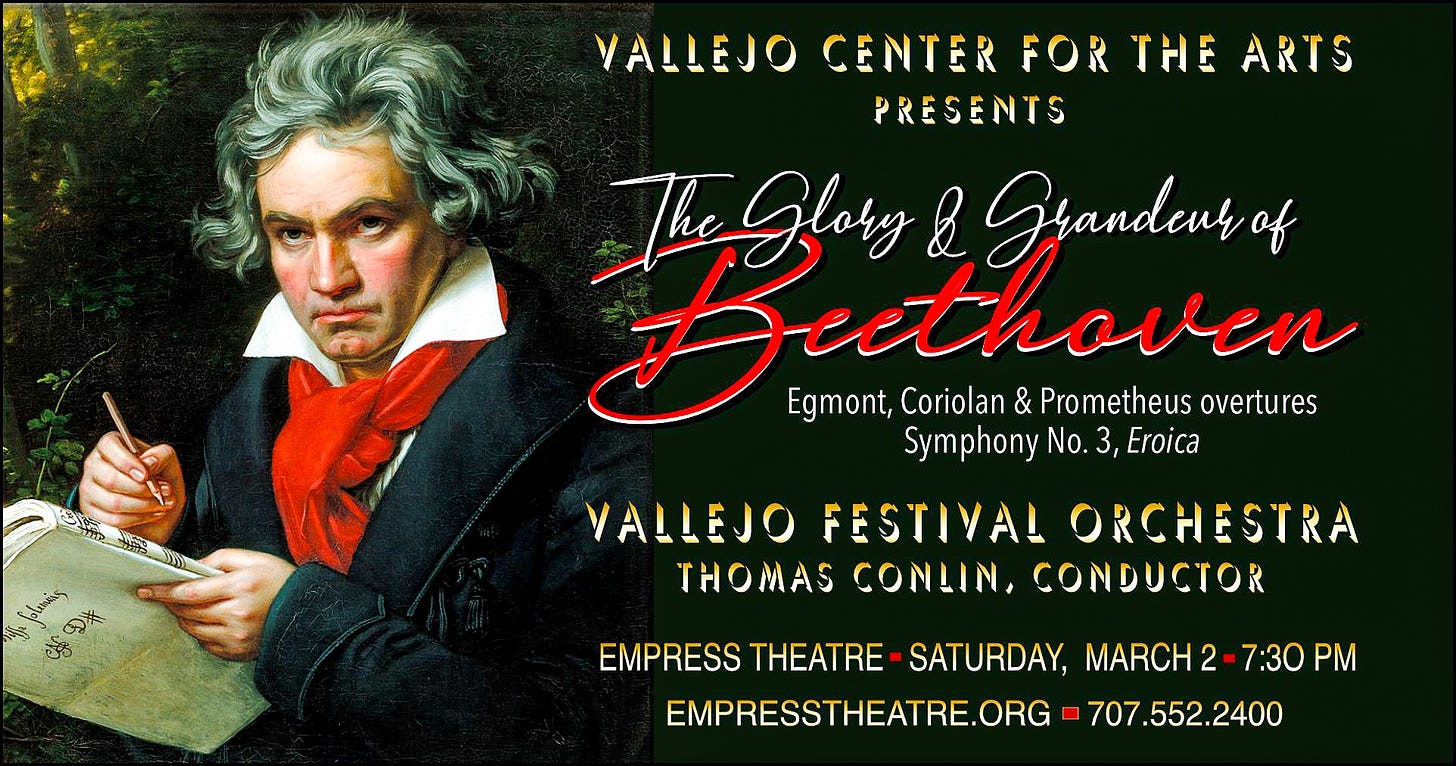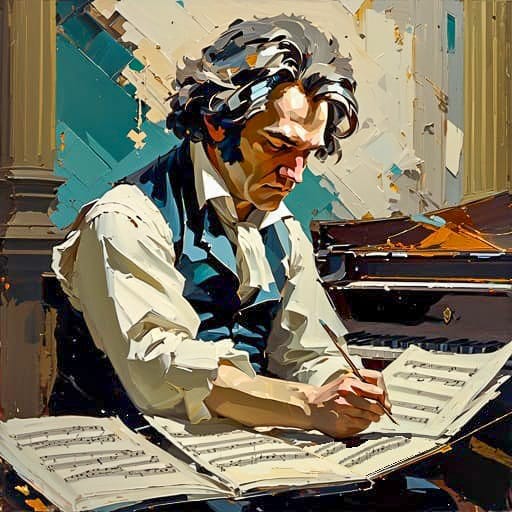NAPA VALLEY, Calif. — Thomas Conlin, Napa Valley’s globe-trotting, Grammy award-winning conductor, has two quotations about music that he cherishes. One is from a statement Leonard Bernstein made on Nov. 22, 1963, after the assassination of President John F. Kennedy: “This will be our reply to violence: to make music more intensely, more beautifully, more devotedly than ever before.”
The other is from Ludwig von Beethoven, whom Conlin considers to be possibly the greatest composer of all time: “Music is the wine which inspires one to new generative processes, and I am Bacchus, who presses out this glorious wine for mankind and makes them spiritually drunken.”
Together these could explain Conlin’s decision to present a program of Beethoven with the Vallejo Festival Orchestra when the Vallejo Center for the Arts presents “The Glory & Grandeur of Beethoven” at the historic Empress Theatre on Saturday, March 2, at 7:30 p.m.
The program brings together four of Beethoven’s greatest compositions in what Conlin calls “a program of trailblazing masterpieces.”
Three great dramatic overtures — “Egmont,” “Coriolan” and “Prometheus” — set the stage for Beethoven’s monumental Symphony No. 3, the “Eroica” (heroic), “a symphony that changed the entire course of Western music.”
Conlin’s six-decade career as a conductor has taken him to five continents — he is working on Australia but is still figuring out how to conduct a concert in Antarctica — leading concerts in storied international venues. His next overseas stop is a performance of Mozart in Palermo, Italy. But first he will be in Vallejo, California.
Conlin’s career began with a piano his father won in a contest when he was 4 years old.
“They couldn’t keep me away from it,” he said. “They had to put a lock on it so I wouldn’t be playing in the middle of the night.
His father didn’t want him to be a musician but instead hoped he would go into politics or business. Conlin, however, knew his life would be in music. Throughout his teens he explored music in all varieties. This included spending a summer studying with Bernstein at Tanglewood, the summer home of the Boston Symphony Orchestra.
“I was too gregarious to be a pianist, sitting alone three or four hours a day,” he said he soon realized. Conducting, however, offered a more social option.
His three majors at Johns Hopkins Peabody Institute, a music and dance conservatory, included conducting as well as composing. He said that while he gravitated to conducting, he found it useful, as well, to study composing.”
His first job out of school was as a rehearsal pianist and vocal coach at the New York Metropolitan Opera, but he also had opportunities to conduct and soon was conducting operas all over the world.
“Beethoven’s life and music have great historical significance, as he lived during a time of political and social upheaval in Europe, much like what we are experiencing today.”
“I love it,” he said. “I love the traveling, seeing different cities. Conducting music in the country where it was written lets me bring back a lot to the U.S. Conducting is learning. And it is really quite humbling to realize I am standing in for Mozart or Beethoven, who can’t be here to do this themselves.”
On the podium he said he is intensely aware of everything, including silence.
“I am aware of the degrees of silence, a stunning level of silence when the music is gorgeous, and there is that magical moment when no one wants to interrupt the silence with applause.”
He and his wife, Renee, a former operatic soprano who went into arts administration and education, were living in Toledo, Ohio, in 2010, when she was offered a job as director of the Napa Valley Museum.
“We were looking for a change,” Conlin said. “I can live anywhere as long as I am near an airport.”
Once settled in Napa (“We love it!”) he continued his world travels. Renee went on to work for San Francisco’s Fine Arts Museums and then took a job as director of the Vallejo Center for the Arts.
Until they moved to Napa, however, Conlin admitted that he had never heard of Vallejo. But there he discovered the art deco Empress Theatre.
“It was built 112 years ago as a vaudeville theater,” he said. “It has amazing acoustics. I have played in thousands of theaters in my career, and this has the best acoustics of any small theater. It’s warm and inviting, and there is not a bad seat in the house.”
Once he decided to play there, he brought together musicians from the San Francisco Symphony and the San Francisco Ballet as well as “some of the finest freelance musicians in the Bay Area” to create the Vallejo Festival Orchestra. (Vallejo also has a resident symphony.) They performed their first concert, “Three Tenors — The Next Generation,” in March 2020. The program harkened back to the famed trio of Placido Domingo, Luciano Pavarotti and Jose Carreras.
“It was a huge hit,” Conlin said, adding that the three new tenors have gone on to successful international careers. “We probably couldn’t afford to bring them back.”
After theaters reopened following the COVID-19 pandemic, he resumed his international work but continued to present three or four concerts a year at the Empress. He said that about 20 percent of the audiences comes from Napa. While Napa Valley once had a symphony, founded in 1933, it was disbanded due to financial problems in 2012.
“I would love to perform in Napa,” he said, “but right now a lack of venues in the valley is a challenge.”
Conlin’s concerts at the Empress have each been built around single composers: Tchaikovsky, Wagner, Sibelius, Johann Strauss and now Beethoven.
Beethoven, who lived from 1770 to 1827, lived in a similar time of conflict and war, he said. Nonetheless he wrote music that was not political but was uplifting and full of joy. His themes typically explore universal topics such as love, heroism, despair and exultation but also include softness and humanity.
“Beethoven’s life and music have great historical significance, as he lived during a time of political and social upheaval in Europe, much like what we are experiencing today,” Conlin said. “His personal struggles, including his battle with deafness, add depth to his story, making his music even more powerful and inspiring. The world is in such turmoil. We need Beethoven to remind us what is good in humanity.”
For nearly two centuries, Beethoven’s music has continued to speak to the universal human experience, Conlin said.
“At this concert you’ll hear for yourself why so many lovers of classical music consider Beethoven the greatest composer ever,” he said.
Tickets for “The Glory & Grandeur of Beethoven” range from $39 to $95 and are available at www.EmpressTheatre.org or at the Empress Theatre Box Office: 707-552-2400.
Sasha Paulsen is a Napa Valley-based novelist and journalist.









Fascinating article!
The Empress is indeed a beautiful little theatre with wonderful programming. I have seen Conlin conduct several times there. He has access to terrific musicians and singers. And, both the Conlins are such nice people. (The season tickets are a real bargain.)